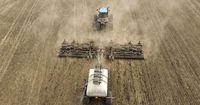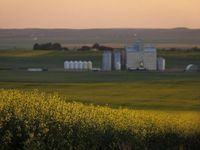Mere weeks away from when they plant their first seeds, canola farmers are bracing for the impact of China’s hefty tariffs on their industry. China has enacted a 100 per cent levy on Canadian canola oil and meal, plus a 25 per cent duty on seafood and pork. “All in all, it’s just bad news,” said Clinton Monchuck, a fourth-generation canola farmer from the Saskatchewan community of Lanigan.
The tariffs come in response to Canada’s 100 per cent levies on Chinese-made EVs and a 25 per cent tax on aluminum and steel products. Former prime minister Justin Trudeau said China had claimed an unfair advantage that was hurting Canada’s auto industry. It’s unclear how consumers will be affected by the tariffs, but industry players say the sticker price of canola oil may not increase in Canada. The federal government has said China’s tariffs are unjustified, but it has not announced any concrete plans to help canola farmers. “From the beginning, our focus has been and will continue to be the protection of Canadian workers and the unwavering support of our hard-working farmers,” read a joint statement this week from three federal cabinet ministers including Agriculture Minister Kody Blois.
Monchuck said the tariffs pose an existential threat to his family’s nearly 120-year-old canola farm. He expects to take a $100,000 hit this year if the tariffs stay in place. That’s without accounting for any other trade actions taken by the U.S., which intends to impose 25 per cent tariffs on all imports from Canada starting in April. China’s actions are bound to resurface difficult memories of 2019 for canola farmers, who were hit with similar tariffs after Canadian authorities detained Meng Wanzhou, an executive of Chinese telecom mammoth Huawei, on a warrant from the U.S. “We’ve gone through this before,” Monchuck said.
Farmers point the finger at the federal government because the tariffs are a direct response to measures to protect the Canadian auto sector, he said. “It’s pretty tough as a farmer, when a government is kind of picking winners and losers,” he said. “We happen to be on the losing end of this discussion.” In response to the tariffs, leaders from the Prairie provinces have requested action from Ottawa to support farmers. Alberta, Saskatchewan, and Manitoba rely heavily on China for canola exports, sending billions of dollars in products overseas each year.
Saskatchewan, with a slim $12-million surplus in its budget tabled on March 19, did not set aside money to help manage the potential impact of tariffs. In Alberta, the governing United Conservative Party set aside $4 billion this year to manage its response to tariffs. In Manitoba, Finance Minister Adrien Sala said this week there would be supports in the provincial budget for people affected by the tariffs.
Meanwhile, Alberta grain farmer Tara Sawyer expressed her frustration as Canada faces a trade war on two fronts. “They’ve turned us into political pawns. We’re paying the price,” said Sawyer, who’s also chair of the Grain Growers of Canada. This week, China slapped a 100 per cent tariff on imports of Canadian canola oil and canola meal, saying it was retaliation for Canadian tariffs on Chinese electric vehicles, steel, and aluminum.
This would have been a painful hit for canola farmers at the best of times, given that China is the second-largest export market for Canadian canola. The largest is the United States, which is scheduled to impose tariffs on Canadian imports on April 2. For Sawyer, a fourth-generation farmer whose family has been working the land in Acme, Alta. since 1903, the trade war has added a new level of anxiety. “It’s all out of our control. We’re taking the hit, but it’s out of our control,” she affirmed.
The Canadian government likely made a calculated decision when imposing tariffs on Chinese EVs and metal last fall, said trade lawyer John Boscariol. Protecting the nascent Canadian EV industry while staying aligned with the increasingly belligerent U.S. was deemed more important than addressing canola farmers’ needs. “I don’t think they would ever admit that they prioritized one industry over another, but it can’t be a surprise to them that China retaliated in this way,” Boscariol noted.
Being effectively shut out of China, now the world’s second-biggest economy, while being encouraged to diversify away from the U.S. is a near-impossible situation for canola farmers, emphasized Chris Davison, president and CEO of the Canola Council of Canada. “Markets the size of the U.S. and China don’t grow on trees,” he said. Last year, Canada exported $7.7 billion worth of canola products to the U.S. and just under $5 billion to China. Of Canadian canola sent to China, roughly $1 billion was in oil and meal form, while the other $4 billion was canola seed.
Canadian canola seed hasn’t been tariffed yet, but is currently the subject of an anti-dumping investigation by China. As fears of further complications loom, the price farmers receive for their canola has already been declining. On February 20, canola seed from the Peace River region was selling for $628.46 per ton, but by March 19, that ton was priced at just $540.32. This price drop occurs amid rising supply costs, which adds an extra layer of uncertainty to farmers’ planning processes.
Hanging on to their product until prices rise is not realistic, as there likely isn’t space to store it and there are ongoing costs to cover. “Can you really afford not to sell it, even if the price is low?” Sawyer questioned, voicing concerns that the trade war could lead to some canola farmers going out of business. “We’ve had some very difficult years, with high input costs and poor yields from weather.”
For now, Sawyer remains hopeful that tariffs will be lifted and that all levels of government will find ways to support canola farmers. “We don’t hear governments talking enough about what agriculture brings to the table. We’re feeding the world,” she asserted, highlighting the importance of agriculture in the overall economy.






